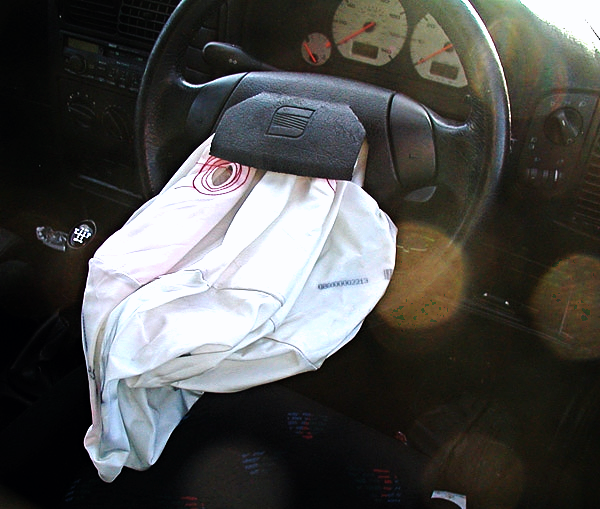The old adage, "it's too good to be true" comes to mind in the light the news that used cars sale representatives have been approved by the Federal Trade Commission (FTC) to sell used cars as certified, despite some of them having safety defects. Some of those defects include vehicles or parts under recall that have yet to be fixed. However, used car salespeople can still sell the cars as 'safe' or as subjected to 'rigorous inspection' vehicles just as long as they post a notice prior to the purchase of the vehicle stating that it may be under recall notice and by providing the buyer with the information to discover if the vehicle is under recall.
CBS News listed that the defects may include exploding faulty Takata air bags in addition to other defects that can cause serious to fatal injuries such as, defective ignition switches, problems with the power steering, and damaged brakes. The FTC came to the decision during a settlement with General Motors (GM) and 2 used car dealers.
Opponents Of Recall Defective Car Sales
The National Highway Traffic Safety Administration (NHTSA) does not approve of the FTCs ruling. In fact, the FTC's agreement goes against NHTSA policy. The NHTSA's policy, which they unfortunately don't have the power to enforce, says that used cars must be inspected and fixed before being resold.
Seconding the NHTSA's view on the issue, Rosemary Shahan, president of Consumers for Auto Reliability and Safety (CARS) said, “The FTCs reckless action will result in more people being killed and injured because of unsafe, defective used cars.” To back up their words with actions, Shahan’s organization is fighting along with a few Democratic senators, the Center for Auto Safety, and the U.S. Public Interest Research Group against the FTC. “It’s a dangerous and irresponsible abuse of the commission’s authority,” Shahan continued. Now the FTC is facing a lawsuit from the 3 organizations on the grounds of consumer safety.
The legislative director for the Massachusetts Public Interest Research Group, Deidre Cummings also said to NBC News that, "The Federal Trade Commission is supposed to crack down on false and misleading advertising, but instead they are encouraging it. They should have protected consumers, but chose to protect reckless car dealers.”
How Defective Car Sales Affect The Auto Industry
Many view the FTC's decision as a change in the auto buying industry. This may lead to car dealers altering their policies to reflect monetary benefits for themselves instead of safety measures for the consumers. In fact some changes have already been made. Ford has already modified their policies to include recall defects such as the Takata airbag. Ford Dealers can now sell vehicles with faulty parts as 'certified' as long as the word 'safe' is not utilized at anytime in the sale. Used Ford buyers will then sign an agreement noting that they are aware of the safety issue and agree to be contacted by the Ford dealer once the replacement parts arrive.
In defense of their new policy, Sara Tatchio of Ford Communications stated that, “The safety of our customers is our top priority. Our dealers must complete all recalls when parts are available. In the extremely rare instance when parts are not available, our policy is that dealers must clearly disclose the situation including printing the open recall information and handing it to the prospective customer. As soon as parts are available, the dealer will then prioritize completing the open recall.”
How Consumers Can Protect Themselves From Recalls
They are few things consumers can do to safeguard themselves from buying a used vehicle that may have recall defects.
- Look up a vehicle's Identification number (VIN) in the NHTSA’s recall lookup tool. The NHTSA’s system will show any outstanding recalls that have yet to be fixed on the vehicle.
- Get a vehicle's history report on websites like CarFax to see if the car has been involved in any accidents, if any original parts have been replaced, and if it has been regularly and properly maintained.
- Before making a vehicle purchase, ask the salesperson about the history of the car and whether any defects or other safety problems have been made aware to them.
- Even if the vehicle list it has been subjected to "rigorous inspection" or as is labeled "safe," get it inspected anyway by a qualified mechanic before buying it. Try to find an auto shop that doesn't have ties to the dealership that the vehicle is being sold from.
These tips are not 100% effective in every used car buying scenario but in general, they may ease the trepidation one may have in buying a used car. Hopefully, armed with the knowledge of past or present recalls and mechanic history, used car buyers can make an informed decision on what vehicle would serve their needs best while keeping them and others safe. After all, getting involved in a car accident due to a faulty or defective car part because you didn't due your due diligence in researching a used car before purchasing it, is an unfortunate way to harm yourself.
Car recall lookup tools provided by government websites and agencies such as the NHTSA are one ideal way to make sure that car buyers are truly purchasing safe cars. It is unfortunate that the FTC would approve of the sale of cars with defective parts, thereby making buyers unable to trust the CPO seal that guarantees buyers that they are buying a recall-free vehicle. If you or someone you know has been injured in a car accident caused by a vehicle under recall, call 844.4MI.FIRM and speak to the experienced staff at The Michigan Law Firm, PLLC. We provide free consultations to discuss your legal options.







